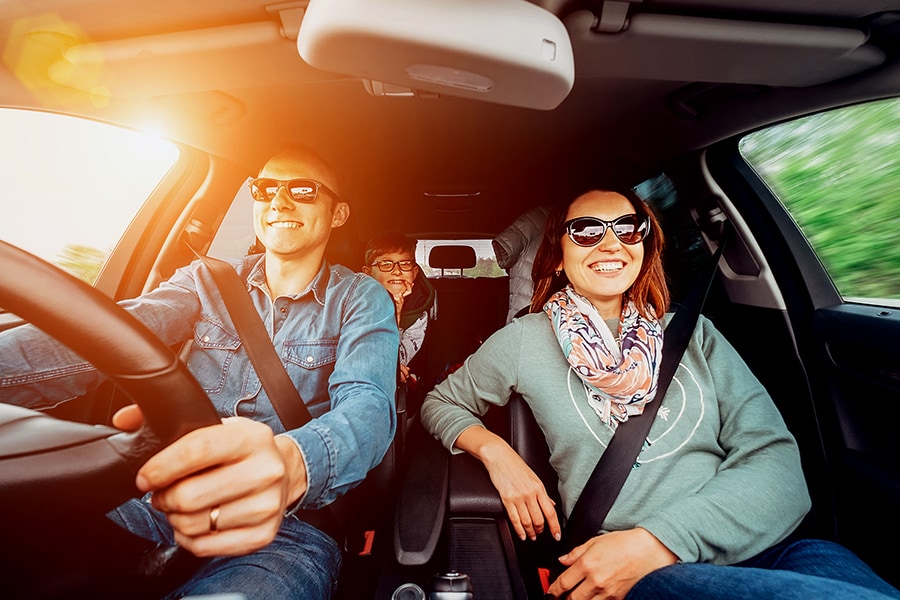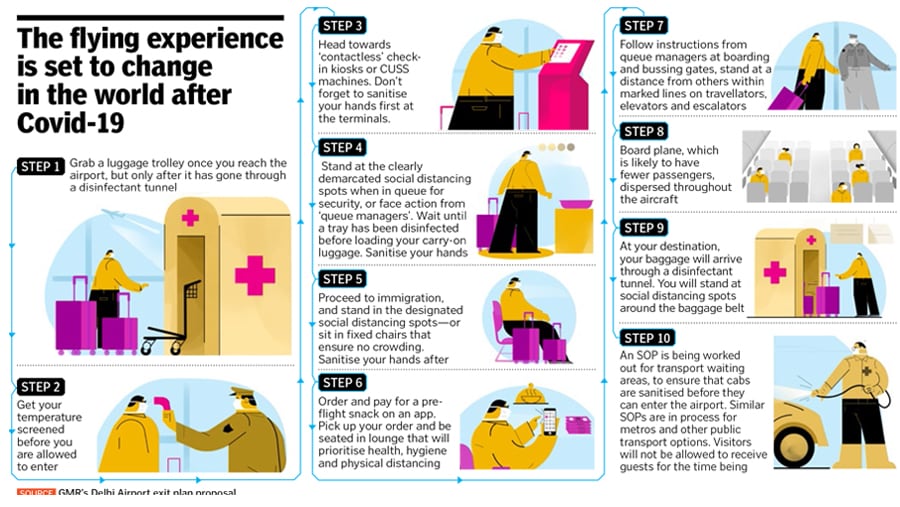#Wanderlost? What the future of travel will look like
How the coronavirus will cause the travel bug to mutate


 Image: Shutterstock
Image: Shutterstock
It had become a bit of a joke in the past few years, as people who lived alternate realities on social media added cliched hashtags to their bios: #Traveller, #Wanderlust, #GlobeTrotter. The year 2020, however, delivered a punch (line) without any humour at all. In India alone, the tourism sector is staring at losses worth ₹1.29 trillion through the calendar year because of Covid-19, according to a study by credit rating agency Care Ratings.
The World Travel and Tourism Council (WTTC) predicts the sector will face a staggering 100 million job losses due to the pandemic and a sharp escalation in economic loss—up to $2.7 trillion of GDP worldwide.
When we emerge after months of government-mandated lockdowns to control the spread of the coronavirus, the world will have all but changed, there’s little doubt of that. While we slowly navigate the contours of living in this brave new world, we will have to also find new ways of, well, navigating the world itself. How will we travel when we travel again?
The answers are complex. Let’s begin with the immediate question:
When will we travel again?
“We have to look at a more near-term recovery before a long-term one. Even a semblance of it will only begin after mid-June—it could be July, August, potentially even September,” says Neeraj Govil, senior vice president, South Asia, Marriott International. “And I say this assuming the health condition will not worsen. We should hopefully continue in the right trajectory and see some ease of restrictions that are reliable by then.”
When and whether we will cross borders in the near future will depend on various factors, which won’t count price within them, as they traditionally have.
According to Deep Kalra, founder and group executive chairman of online travel aggregator MakeMyTrip, “While the recovery will be sluggish, the first phase of travel will be led by immediate and essential travel—with people travelling back home, to their city of work or for medical purposes. The subsequent phases will see essential business-related travel followed by leisure travel as fear subsides. International travel, however, may take a few quarters or more to open up.”
Many travel and hospitality operators, especially in the luxury space, have written off 2020, Daniel Andre Langer, CEO of luxury brand strategy firm Équité said at a recent Forbes India webinar.
In the non-luxury sector, branded budget hotels are likely to recover first as essential business travel kicks in. “CEOs can do video calls, but for the salespeople on the road, they will have to keep moving, especially in a bad economy,” says Kapil Chopra, founder and CEO of boutique luxury hotel brand The Postcard Hotel.
Where will we go?
Aside from business travel, experts say a sizeable number of people may need a quick getaway after being locked down for a long time. Instead of browsing flight ticket and hotel discount deals to decide, people’s choice of destination will be based on two paramount factors: Safety and sanitation.
Of the various modes of transport available, driving in your own vehicle is likely to be the safest, as it eliminates contact with other travellers. So the humble road trip is expected to make a big comeback. As with other instant gratification that the TikTok generation has come to live with, travel, too, will be consumed in the ‘short format’ until a reliable vaccine surfaces. Expect quick weekend getaways or staycations to pick up steam, albeit slowly, once people work up the courage and feel the need to have some escape, a taste of the outdoors.
 Image: Shutterstock
Image: Shutterstock
Brand preferences will become more prominent customers will build loyalty towards brands that they trust. “According to our recent survey, a high 93 percent of respondents said they are likely to switch from unbranded to branded hotels post lockdown for better hygiene requirements for their employees,” says Vaibhav Aggarwal, founder and CEO of budget hotel chain FabHotels.
Leisure destinations within driving distance from cities (about five hours) will therefore recover first. Travellers from Mumbai might drive down to holiday in the Western Ghats, to Pune, even to Goa, or hill stations such as Mahabaleshwar and Matheran. From Delhi, Mussoorie, Chandigarh, Shimla could pick up.
Travelling from a green zone to a green zone will most likely be the first travel route to open, and gradually, more green zones will be added to the list. Each location will have its own guidelines that hotel providers will have to be cognisant of, as per the state situation at the time. So the standard operating procedures for Mahabaleshwar, says Govil, will be different from those in Goa.
“Unfortunately, some of the popular ways to travel before the outbreak such as group tours and activities will hit a pause,” says Kalra of MakeMyTrip. “People will prefer travelling to unexplored tourist spots. Private eco and nature tours will rise for young travellers.”
“Rightly so, the ministry of tourism is focusing on a ‘Dekho Apna Desh’ campaign to promote the diversity of domestic tourism in India right now,” says Saurabh Rai, executive vice president-South & South East Asia, Middle East, Africa & Australasia-Preferred Hotels & Resorts. “Even so, the success of this will be directly linked to how the central and state tourism boards (along with hotel and retail segments) can build and deliver messaging that invites trust on their levels of health, hygiene and sanitation standards.”
“There will be destinations that do a better job at marketing themselves,” agrees Marriott’s Govil. “Destination marketing supported by destination management can send the right message to the end consumer and will see greater success. We have to remember that, for the near term, it’s not going to be about volumes, but about a higher quality of ticket.”
At the higher end, people will be likely to indulge more than they would otherwise to ensure that their holidays are safe. For instance, Chopra says, a group that needs six rooms has booked out an entire 11-room property in Goa for July (in a flexible booking, of course) so that no one else will be on the property when they travel. “People have been stuck at home for weeks. They will get out—and spend money to get the safest luxury experience they can,” he adds. “While people will be afraid to enter large, 400-room hotels, boutique properties will be able to attract more trust.”
The recovery trajectory is expected to be such: First, road trips then, domestic vacations and finally, international travel.
Destinations like Bhutan and Sri Lanka could pick up sooner than other international spots, as they have been Covid-19-free. “I have two kids and if I have to travel from Delhi, I’d rather go somewhere like Bhutan rather than Goa. The country is disease-free, which means I can relax on holiday. Such decisions could play a key role once tourism revives,” Chopra says.
Thailand, Scandinavia, the Maldives and parts of Africa stand to gain in this area. “These destinations will need to ensure sound health and hygiene practices too. Covid-19 might have been the catalyst, but the world was already moving in this direction,” says Rai.

What to do when we get there?
Those idyllic images of perfect holidays—sipping a mimosa by the pool visiting a world-heritage site chatting up interesting strangers at crowded nightclubs—will all come to a halt. Hoteliers say swimming pools and spa areas are unlikely to open up for at least three to six months, as people would stay away from using communal facilities until a vaccine is around.
You’ll see the difference just as you enter a property. Hotels are working on minimising ‘touchpoints’ (up to 200 of them) to offer guests a contactless experience. After the 26/11 terror attacks in Mumbai, it became commonplace to have security checks and bags scanned even before you walked in now, the entire hospitality process will have changed. No host will garland you in welcome.
Instead, your temperature will be screened and you’ll complete a digital check-in at a front desk, which may also provide face shields and sanitisers should you need them. You may have a longer wait for the elevator as the number of people in each ride will be restricted. Meals will have to be planned and pre-booked—restaurants will work at reduced capacities and enforce social distancing measures (possibly eliminating the buffet altogether) but will work longer hours to accommodate all guests.
‘Tourism’, as we know it, is unlikely to make a resurgence this year. Hotels will have to become creative about how to engage guests—without communal facilities like the swimming pool, and minimising their need to go outside to explore—with innovative in-room experiences. These could be in-room dining features, videos or movies on demand, providing video games, board games and so on, says Sujit Banerjee, former union secretary, tourism, and secretary general, WTTCII (World Travel & Tourism Council, India Initiative).
“A holistic mix of digital and actual travel experiences will be a step in the right direction to maintain healthy, social and fun interactions,” adds Dharamveer Singh Chouhan, co-founder and CEO of Zostel, a network of hostels in India and Nepal. “We are working on a digital product where we intend to bring the entire Zostel experience online, where you can experience the vibe of our properties and interact with people you would meet in our common rooms on our online platform. With dedicated focus on art, culture and people, we are looking to make virtual socialising cool.”
How can hotels reinvent?
Hospitality players will have to conserve cash cut down on non-essentials plan newer revenue streams, while ensuring comfort and confidence of customers, says Gurbaxish Singh Kohli, vice president, FHRAI, and president, Hotel and Restaurant Association of Western India. One such initiative could be to offer socially distanced co-working spaces, as customers could trust managed hotel chains to follow norms better than the average co-working space.
“We launched the #WorkfromFabHotels campaign, where we provided safe spaces for employees of large corporates to work peacefully while practising social distancing at our hotels. Several leading IT, consulting, BPO, and essential service clients have found value in it. This initiative saw lots of uptake before the lockdown, and we believe this will be relevant once the lockdown phases out,” says Aggarwal of FabHotels. “We are officially in the ‘Move or be Moved’ era,” adds Rai of Preferred Hotels. “The speed of change has been drastic and will continue to be so. If we wait to see how it all pans out, we’ll be too late.”
Rai also expects consolidation in the industry, given the economic recession ahead. “There is a heightened need for clarity, simplicity and transparency in brand promise. ‘Me too’ players will be challenged to rethink their approach. I believe tomorrow’s market would provide an opportunity for individual, unique and authentic experiences,” he adds.
And when some of the dust settles, hoteliers are hopeful people will seek out travel experiences with as much passion as they did before the virus. “No amount of tech would be able to replace the human connections that can be built by meeting face to face,” Aggarwal says. “We have always been a mobile species and are fundamentally wired to discover, explore, and connect. That wiring will overcome any short-term disruption we face.”
First Published: May 22, 2020, 14:30
Subscribe Now